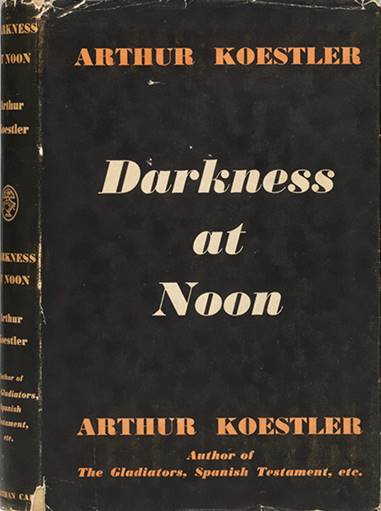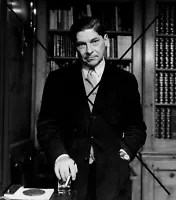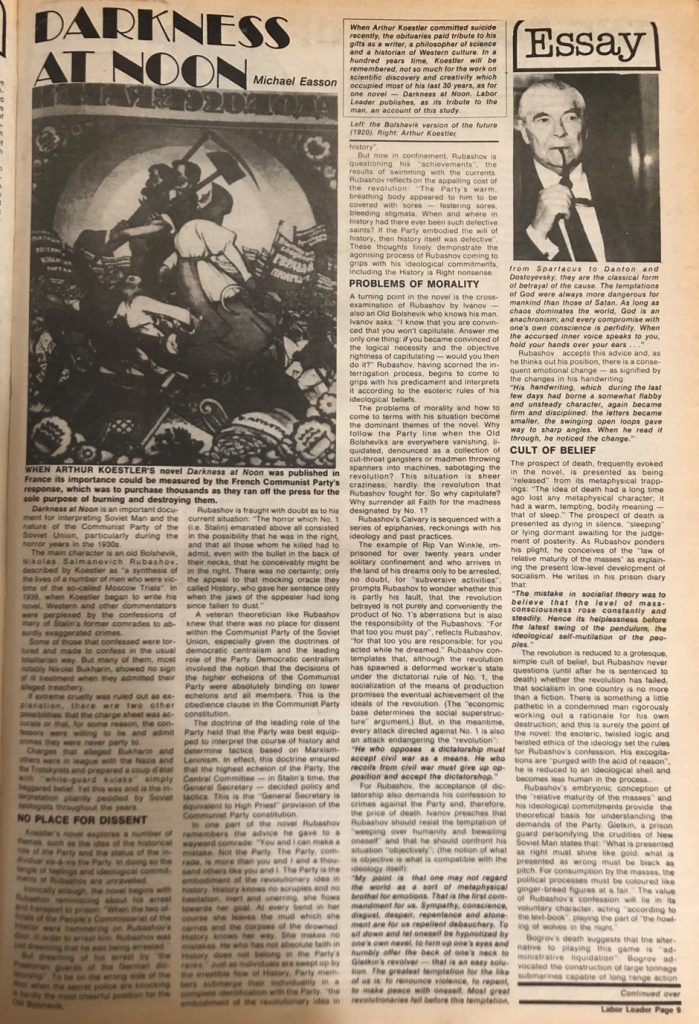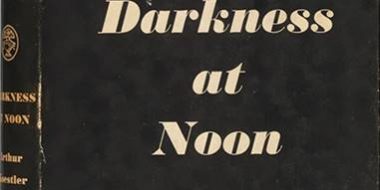Published in Labor Leader, Vol. 7, No.1, May 1983, pp. 9-10.

When Arthur Koestler’s novel Darkness at Noon was published in France its importance could be measured by the French Communist Party’s response, which was to purchase thousands as they ran off the press for the sole purpose of burning and destroying them.
Darkness at Noon is an important document for interpreting Soviet Man and the nature of the Communist Party of the Soviet Union, particularly during the horror years in the 1930s.
The main character is an old Bolshevik, Nikolas Salmanovich Rubashov, described by Koestler as “a synthesis of the lives of a number of men who were victims of the so-called Moscow Trials.” In 1939, when Koestler began to write his novel, Western and other commentators were perplexed by the confessions of many of Stalin’s former comrades to absurdly exaggerated crimes. Some of those that confessed were tortured and made to confess in the usual totalitarian way. But many of them, most notably Nikolai Bukharin, showed no sign of ill-treatment when they admitted their alleged treachery.
If extreme cruelty was ruled out as explanation, there were two other possibilities: that the charge sheet was accurate or that, for some reason, the confessors were willing to lie and admit crimes they were never party to.
Charges that alleged Bukharin and others were in league with the Nazis and the Trotskyists and prepared a with ‘white-guard kulaks’ simply beggared belief. Yet this was and is the interpretation pliantly peddled by Soviet apologists throughout the years.
No Place For Dissent
Koestler’s novel explores a number of themes, such as the idea of the historical role of the Party and the status of the individual vis-a-vis the Party. In doing so the tangle of feelings and ideological commitments of Rubashov are unravelled.
Ironically enough, the novel begins with Rubashov reminiscing about his arrest and transport to prison: “When the two officials of the People’s Commissariat of the Interior were hammering on Rubashov’s door in order to arrest him, Rubashov was just dreaming that he was being arrested.” But dreaming of his arrest by “[t]he Praetorian guards of the German dictatorship.” To be on the wrong side of the door when the secret police are knocking is hardly the most cheerful position for the old Bolshevik.
Rubashov is fraught with doubt as to his current situation: “The horror which No. 1 [i.e., Stalin] emanated above all consisted in the possibility that he was in the right, and that all those whom he killed had to admit, even with the bullet in the back of their necks, that he conceivably might be in the right. There was no certainty; only the appeal to that mocking oracle they called History, who gave her sentence only when the jaws of the appealer had long since fallen to dust.”
A veteran theoretician like Rubashov knew that there was no place for dissent within the Communist Party of the Soviet Union, especially given the doctrines of democratic centralism and the leading role of the Party. Democratic centralism involved the notion that the decisions of the higher echelons of the Communist Party were absolutely binding on lower echelons and all members. This is the obedience clause in the Communist Party constitution.
The doctrine of the leading role of the Party held that the Party was best equipped to interpret the course of history and determine tactics based on Marxism-Leninism. In effect, this doctrine ensured that the highest echelon of the Party, the Central Committee – in Stalin’s time, the General Secretary – decided policy and tactics. This is the ‘General Secretary is equivalent to High Priest’ provision of the communist Party constitution.
In one part of the novel Rubashov remembers the advice he gave to a wayward comrade: “You and I can make a mistake. Not the Party. The Party, comrade, is more than you and I and a thousand others like you and I. The Party is the embodiment of the revolutionary idea in history. History knows no scruples and no hesitation. Inert and unerring, she flows towards her goal. At every bend in her course she leaves the mud which she carries and the corpses of the drowned. History knows her way. She makes no mistakes. He who has not absolute faith in History does not belong in the Party’s ranks.” Just as individuals are swept up by the irresistible flow of History, Party members submerge their individuality in a complete identification with the Party, “the embodiment of the revolutionary idea in history.”
But now in confinement, Rubashov is questioning his ‘achievements’, the results of swimming with the currents. Rubashov reflects on the appalling cost of the revolution: “The Party’s warm, breathing body appeared to him to be covered with sores – festering sores, bleeding stigmata. When and where in history had there ever been such defective saints? If the Party embodied the will of history, then history itself was defective.” These thoughts finely demonstrate the agonising process of Rubashov coming to grips with his ideological commitments, including the History is Right nonsense.
Problems of Morality
A turning point in the novel is the cross-examination of Rubashov by Ivanov – also an Old Bolshevik who knows his man. Ivanov asks: “I know that you are convinced that you won’t capitulate. Answer me only one thing: if you became convinced of the logical necessity and the objective rightness of capitulating – would you then do it?” Rubashov, having scorned the interrogation process, begins to come to grips with his predicament and interprets it according to the esoteric rules of his ideological beliefs.
The problems of morality and how to come to terms with his situation become the dominant themes of the novel. Why follow the Party line when the Old Bolsheviks are everywhere vanishing, liquidated, denounced as a collection of cut-throat gangsters or madmen throwing spanners into machines, sabotaging the revolution? This situation is sheer craziness; hardly the revolution that Rubashov fought for. So why capitulate? Why surrender all Faith for the madness designated by No. 1?
Rubashov’s Calvary is sequenced with a series of epiphanies, reckonings with his ideology and past practices.
The example of Rip Van Winkle, imprisoned for over twenty years under solitary confinement and who arrives in the land of his dreams only to be arrested, no doubt, for ‘subversive activities’, prompts Rubashov to wonder whether this is partly his fault, that the revolution betrayed is not purely and conveniently the product of No. 1’s aberrations but is also the responsibility of the Rubashovs: “[f]or that too you must pay,” reflects Rubashov, “for that too you are responsible; for you acted while he dreamed.” Rubashov contemplates that, although the revolution has spawned a deformed worker’s state under the dictatorial rule of No. 1, the socialization of the means of production promises the eventual achievement of the ideals of the revolution – the ‘economic base determines the social superstructure’ argument. But in the meantime, every attack directed against No. 1 is also an attack endangering the ‘revolution’: “He who opposes a dictatorship must accept civil war as a means. He who recoils from civil war must give up opposition and accept the dictatorship.”
For Rubashov, the acceptance of dictatorship also demands his confession to crimes against the Party and, therefore, the price of death. Ivanov preaches that Rubashov should resist the temptation of “weeping over humanity and bewailing oneself” and that he should confront his situation “objectively”; (the notion of what is objective is what is compatible with the ideology itself): “My point is that one may not regard the world as a sort of metaphysical brothel for emotions. That is the first commandment for us. Sympathy, conscience, disgust, despair, repentance and atonement are for us repellent debauchery. To sit down and let oneself be hypnotized by one’s own navel, to turn up one’s eyes and humbly offer the back of one’s neck to Gletkin’s revolver – that is an easy solution. The greatest temptation for the like of us is: to renounce violence, to repent, to make peace with oneself. Most great revolutionaries fell before this temptation, from Spartacus to Danton and Dostoyevsky; they are the classical form of betrayal of the cause. The temptations of God were always more dangerous for mankind than those of Satan. As long as chaos dominates the world, God is an anachronism; and every compromise with one’s own conscience is perfidity. When the accursed inner voice speaks to you, hold your hands over your ears…”
Rubashov accepts this advice and, as he thinks out his position, there is a consequent emotional change – as signified by the changes in his handwriting: “His handwriting, which during the last few days had borne a somewhat flabby and unsteady character, again became firm and disciplined: the fetters became smaller, the swinging open loops gave way to sharp angles. When he read it through, he noticed the change.”
Cult of Belief
The prospect of death, frequently evoked in the novel, is presented as being ‘released’ from its metaphysical trappings: “The idea of death had a long time ago lost any metaphysical character; it had a warm, tempting, bodily meaning – that of sleep.” The prospect of death is presented as dying in silence, “sleeping” or lying dormant waiting for the judgment of posterity. As Rubashov ponders his plight, he conceives of the “law of relative maturity of the masses” as explaining the present low-level development of socialism. He writes in his prison diary that: “The mistake in socialist theory was to believe that the level of mass-consciousness rose constantly and steadily. Hence its helplessness before the latest swing of the pendulum, the ideological self-mutilation of the peoples.”

The revolution is reduced to a grotesque, simple cult of belief, but Rubashov never questions (until after he is sentenced to death) whether the revolution has failed, that socialism in one country is no more than a fiction. There is something a little pathetic in a condemned man rigorously working out a rationale for his own destruction; and this is surely the point of the novel: the esoteric, twisted logic and twisted ethics of the ideology set the rules for Rubashov’s confession. His excogitations are “purged with the acid of reason,” he is reduced to an ideological shell and becomes less human in the process.
Rubashov’s embryonic conception of the “relative maturity of the masses” and his ideological commitments provide the theoretical basis for understanding the demands of the Party. Gletkin, a prison guard personifying the crudities of New Soviet Man states that: “What is presented as right must shine like gold; what is presented as wrong must be black as pitch. For consumption by the masses, the political processes must be coloured like ginger-bread figures at a fair.” The value of Rubashov’s confession will lie in its voluntary character, acting “according to the text-book”, playing the part of “the howling of wolves in the night.”
Bogrov’s death suggests that the alternative to playing this game is “administrative liquidation.” Bogrov advocated the construction of large tonnage submarines capable of long-range action as opposed to the short-range, small tonnage submarines. The Party, however, supported the policy of building small submarines. Ivanov points out: “Bogrov had a strong following in the Admiralty. And amongst the officers of the old guard. It would not have been enough to put him out of the way; he also had to be disciplined. A trial was projected to unmask the partisans of big tonnage as saboteurs and traitors. e had already brought several little engineers to the point of being willing to confess publicly to whatever we liked. But Bogrov wouldn’t play the game. He declaimed up to the very end in big tonnage and world revolution. [Big tonnage, long range submarines are able to pursue a policy of aggression for further revolution. Small tonnage, short range submarines, however, are only suitable for coastal defense.] He was two decades behind the times. He would not understand that the times are against us, that Europe is passing through a period of reaction, that we are in the hollow of a wave and must wait until we are lifted by the next. In a public trial he would only have created confusion amongst the people. There was no other way possible than to liquidate him administratively”, (i.e., murder him).
Pilate’s Question
Rubashov co-operates not in fear of torture or death, but because of his conviction that struggle against the party would threaten all that he has fought for: “Who could call it betrayal if, instead of the dead, one held faith with the living?”
Gletkin’s answer to Pilate’s question is simply that “Truth is what is useful to humanity. falsehood what is harmful.”And Rubashov, accepting that the Party is the embodiment of the ideals of revolution, decides to act the role the Party has now assigned for him. But this process of questioning, self-doubt about the Party and the concentrated thinking out of his position – intensified under the pressure of interrogation and the metaphorical pain of toothache – is an extremely agonising business. Rubashov, for example is shown as envying prisoner No. 402, “whose caste possessed a rigid code of honour prescribing how to live and how to die. To that one could cling. For his own kind there was no text-book: everything had to be worked out.”
But Rubashov does not labour in a purely abstract, intellectual field; he is a vacillating man, beset with nagging doubts. Indeed, during his trial, he is portrayed as resisting the temptation not to confess, to fling the accusations back at the accusers. But once condemned and under sentence of execution, the abstraction ‘death’ becomes real and Rubashov returns to the perplexing problems which first led him to join the Party. The following passage is worth quoting in extenso:
He continued pacing through his cell. Since the bell of silence had sunk over him, he was puzzling over certain questions to which he would have liked to find an answer before it was too late. They were rather naive questions; they concerned the meaning of suffering, or, more exactly, the difference between suffering which made sense and senseless suffering. Obviously only such suffering made sense, as was inevitable; that is, as was rooted in biological fatality. On the other hand, all suffering with a social origin was accidental, hence pointless and senseless. The sole object of revolution was the abolition of senseless suffering. But it had turned out that the removal of this kind of suffering was only possible at the price of a temporary enormous increase in the sum total of the first. So the question now ran: Was such an operation justified? Obviously it was, if one spoke in the abstract of ‘mankind’; but, applied to ‘man’ in the singular, to the cipher 2-4, the real human being of bone and flesh and blood and skin, the principle led to absurdity. As a boy, he had believed that in working for the Party he would find an answer to all questions of this sort. The work had lasted forty years, and right at the start he had forgotten the question for whose sake he had embarked on it. Now the forty years were over, and he returned to the boy’s original perplexity. The Party had taken all he had to give and never supplied him with the answer.
I have quoted this passage at length because it highlights where the purity of ideals are compromised by the contaminations of action. After forty years’ blind allegiance to the Party, Rubashov has forgotten for what reasons and on whose behalf he embraced the cause; throughout his life he has suppressed the questions he originally thought the Party would provide answers for. The price of revolution seems to entail all the evils it seeks to cast from mankind. The primacy of the interests of mankind over the interests of man seems flawed by a fatal contradiction: “The Party denied the free will of the individual – and at the same time it exacted his willing self-sacrifice. It denied his capacity to choose between two alternatives – and at the same time it demanded that he should constantly choose the right one. It denied his power to distinguish good and evil – and at the same time it spoke pathetically of guilt and treachery. The individual stood under the sign of economic fatality, a wheel in a clockwork which had been wound up for all eternity and could not be stopped or influenced – and the Party demanded that the wheel should revolt against the clockwork and change its course. There was somewhere an error in the calculation; the equation did not work out.”
Indeed Rubashov reflects: “Soon it would be over. But when he asked himself, ‘for what actually are you dying?’ he found no answer.” Rubashov wants to live, to devote more time to the issues which he has not yet resolved.
Uniformed Giant
The Old Bolsheviks, who dreamed of creating a new socialist man, have given way to the “uniformed giants”, the epigones of the revolutionaries – the dumb, humourless apparatchiks of No. 1. The movement which promised a better future for mankind has spawned the sub-human Gletkins, the Neanderthals who have survived the flood. In spite of this, Rubashov cannot bring himself to totally reject his ideological doctrines: “Perhaps the Revolution had come too early, an abortion with monstrous, deformed limbs. Perhaps the whole thing had been a bad mistake in timing… History had a slow pulse; man counted in years, history in generations. Perhaps it was still only the second day of creation.”
Perhaps, but Rubashov cannot be sure; and in being uncertain Rubashov cannot die with the satisfaction that he is a martyr for his faith; near execution, Rubashov’s “oceanic sense”, the counter revolutionary “metaphysical brothel” of the mind, casts doubts about his faith: “Did there really exist any such goal for this wandering mankind? That was a question to which he would have liked an answer before it was too late. Moses had not been allowed to enter the land of promise either. But he had been allowed to see it, from the top of the mountain, spread at his feet. Thus it was easy to die, with the visible certainty of one’s goal before one’s eyes. He, Nicholas Salmanovich Rubashov, had not been taken to the top of a mountain; and wherever his eye looked, he saw nothing but desert and the darkness of night.”
Rubashov’s ideological beliefs are not sustained by a vision of the Promised Land: there is only darkness – when it ought to be noon.
Postscript (2015)
With the demise of communism, few people anymore read Darkness at Noon.
But it was once an important insight into the communist mentality. In 1983 I wanted to write a readable account for a newspaper of the Labor Right at a time when there was still a Soviet Union.
This essay, I am sure, was based on one I had written in my final year at university, in my Political Science honours year.








